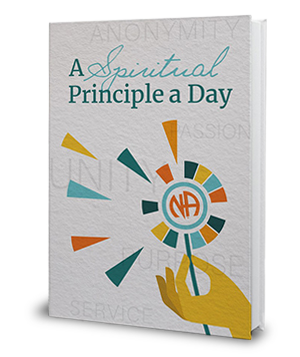Welcome to Narcotics Anonymous of NJ. Our Message Is…
That an addict, any addict can stop using drugs,
lose the desire to use, and find a new way to live.
Helpline
If you feel you have a problem with drugs, call our helpline
Events
See upcoming NA events and activities in NJ
Narcotics Anonymous is a nonprofit fellowship or society of men and women for whom drugs had become a major problem. We are recovering addicts who meet regularly to help each other stay clean.
– Narcotics Anonymous Basic Text, page 9
Recovery from addiction is possible and available through the 12 Steps and 12 Traditions of Narcotics Anonymous.
Narcotics Anonymous is FREEDOM from active addiction.
Narcotics Anonymous is an international, community-based association of recovering drug addicts with over 61,000 weekly meetings in over 131 countries worldwide.

Just for Today
Sometimes recovery gets downright difficult. It can be even more difficult to get humble enough to ask for help. We think, "I have all this time clean. I should be better than this!" But the reality of recovery is simple: whether we have thirty days or thirty years clean, we must be willing to ask for help when we need it.
Humility is a common theme in our Twelve Steps. The program of Narcotics Anonymous is not about keeping up appearances. Instead, the program helps us get the most from our recovery. We must be willing to lay bare our difficulties if we expect to find solutions to problems that arise in our lives.
There's an old expression sometimes heard in Narcotics Anonymous: We can't save our face and our ass at the same time. It isn't easy to share in a meeting when we have a number of years clean only to dissolve into tears because life on life's terms has made us realize our powerlessness. But when the meeting ends and another member comes up and says, "You know, I really needed to hear what you had to say," we know that there is a God working in our lives.
The taste of humility is never bitter. The rewards of humbling ourselves by asking for help sweetens our recovery.
A Spiritual Principal a Day
Speaking to and treating other members with love, care, and respect is effortless . . . except when it isn't. But that's on us. To practice unity, we learn self-awareness.
It could be fear that we'll say the wrong thing to the member who is grieving the loss of 20 years of cleantime that makes us look past her. Instead of reassuring her, we say nothing. This action, driven by our discomfort, she assumes is a harsh judgment of her relapse. It could be that serious bout of depression we're experiencing that causes us to snap at a newer member who set up the chairs incorrectly. And that sponsee brother's story that he's shared three times already this week! We can't help but roll our eyes as far as they will go. Maybe we just forgot to eat?
We don't intend to be hurtful or dismissive. We won't always know the right thing to say. And we don't all express--or prefer to receive--love, care, and respect in the same ways. In times of need, one member might approach us with warmth and a nonjudgmental ear. Another might demand, "Take the cotton out of your ears!" in the style of old-school tough love. An action of physical contact--a friendly hand on the shoulder or that big NA hug-- most often will be welcomed, but sometimes it will be rebuffed.
Our experience tells us that we must be doing something right because so many addicts come to meetings and stay clean. We may not always exercise "loving care" flawlessly, but we get better at it. We learn to exercise patience and kindness, even as we share opinions and suggestions. We work on breaking through our discomfort and uncertainty because we care about each other--and we want to show it. And we listen to each other's stories (no matter how many times) and try to be respectful because we value our group, even when a member of it bugs us. As long as we're trying to be supportive, we are exercising the principle of unity.

